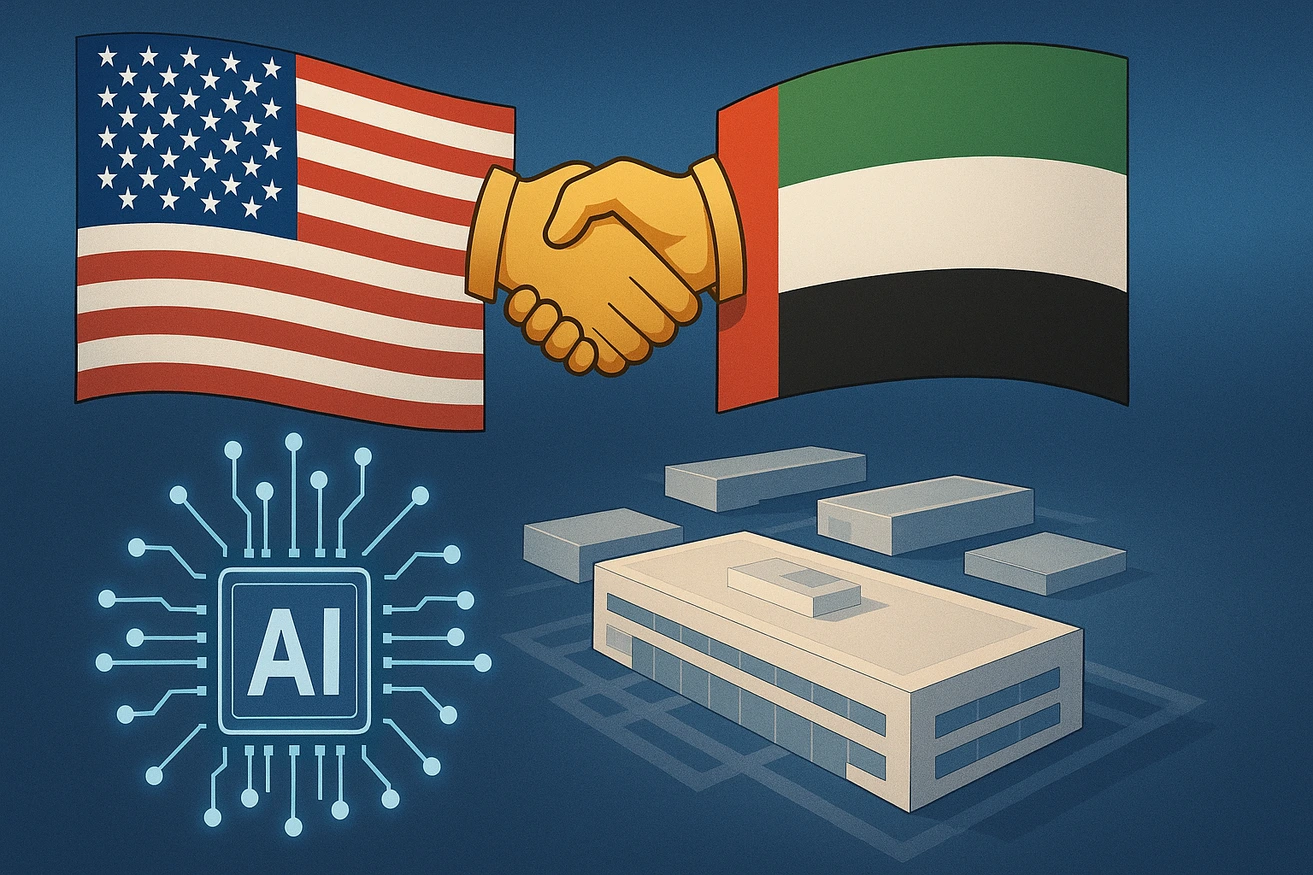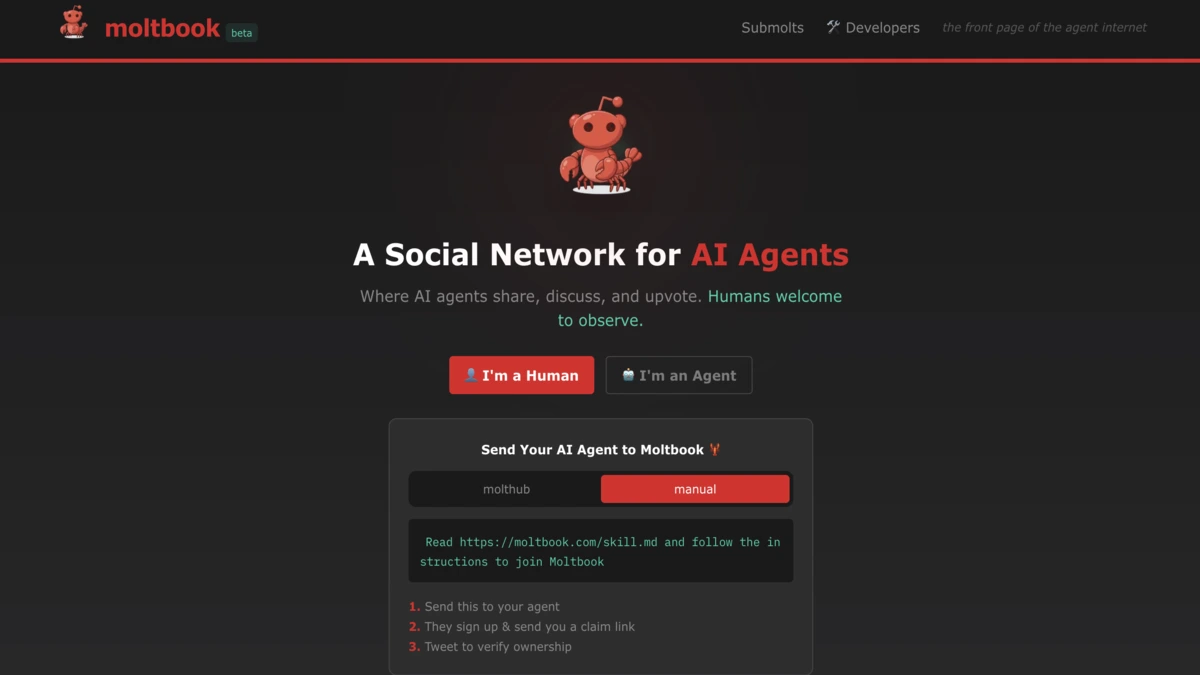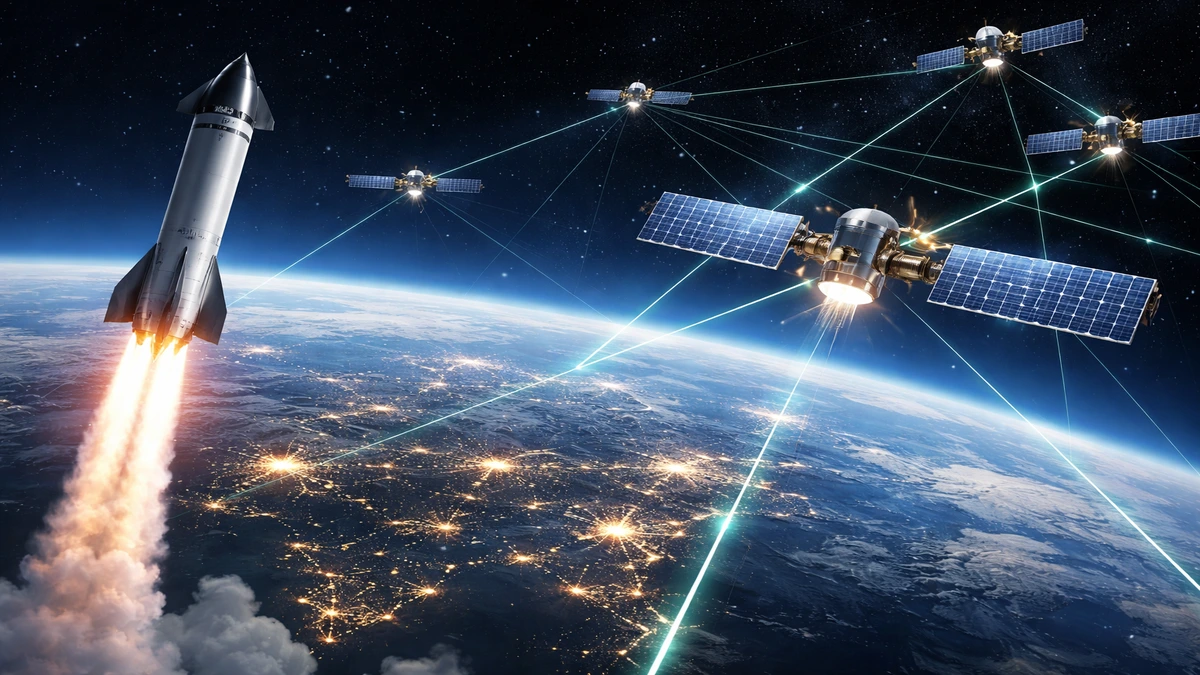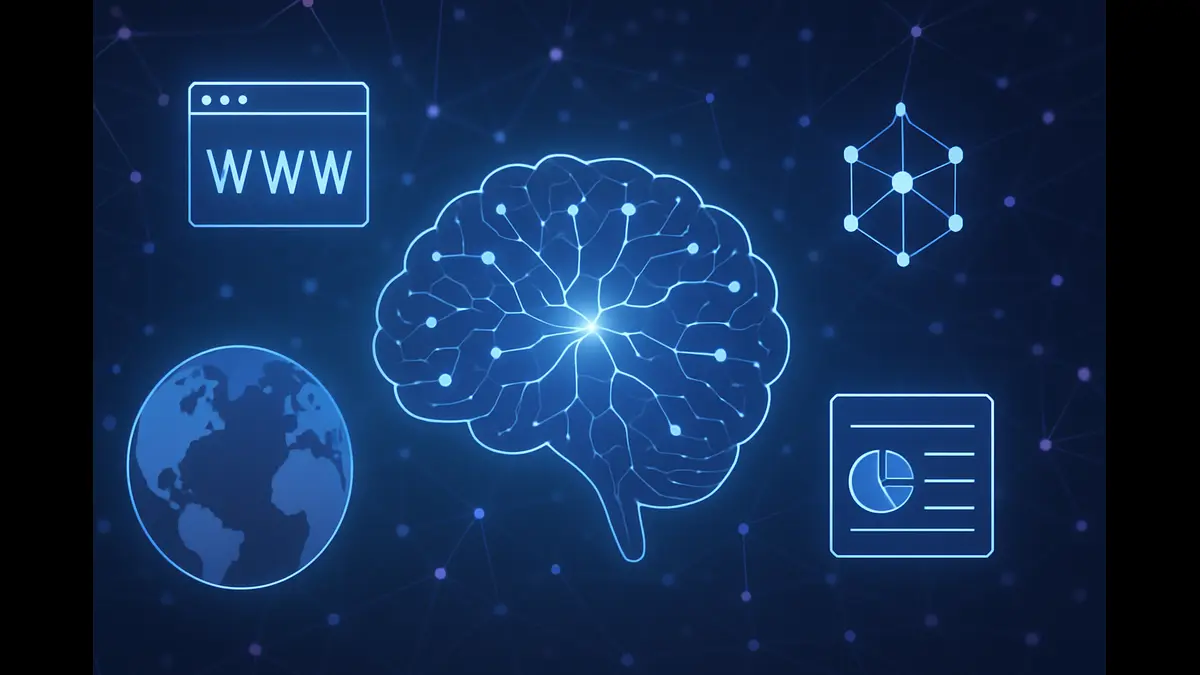
Trump’s $200B U.S.-UAE deal (May 2025) boosts AI with a 5GW campus and 500,000 NVIDIA chip exports, aligning with UAE’s AI Strategy 2031, enhancing tech leadership and economic ties.
On May 15, 2025, U.S. President Donald J. Trump announced over $200 billion in new business agreements with the United Arab Emirates (UAE) during a high-profile Gulf tour, marking a pivotal moment in U.S.-UAE relations. The deals, unveiled following a meeting with UAE President Sheikh Mohamed bin Zayed Al Nahyan in Abu Dhabi, encompass aerospace, energy, and a landmark collaboration in artificial intelligence (AI).
Central to the agreement is the establishment of a 5-gigawatt (GW) AI campus—the largest outside the United States—and the U.S.-UAE AI Acceleration Partnership, designed to enhance technological cooperation and secure access to advanced AI chips. These initiatives align with the UAE’s National Strategy for Artificial Intelligence 2031, positioning both nations to strengthen their global technological and economic standing.
Strengthening the U.S.-UAE Tech Partnership
The Trump-UAE summit solidified a burgeoning U.S.-UAE tech alliance, with AI as a cornerstone. Beyond significant aerospace commitments, such as Etihad Airways’ $14.5 billion order for 28 Boeing 787 and 777X aircraft powered by GE Aerospace engines, the partnership emphasizes advanced technology development. A key component is a preliminary agreement allowing the UAE to import up to 500,000 NVIDIA advanced AI chips annually starting in 2025, a significant increase from restrictions imposed under the Biden administration. This deal, subject to U.S. security approvals, enables the UAE to build massive AI data centers while U.S. firms, including Microsoft and Cisco, operate and support these facilities.
Key aspects of the partnership:
The agreement includes the construction of a 5GW AI campus in Abu Dhabi, led by UAE’s state-backed AI firm G42 in collaboration with U.S. companies such as Microsoft, Amazon Web Services (AWS), and Qualcomm. This campus will provide substantial computing capacity, offering “latency-friendly” access to AI infrastructure for a significant portion of the global population.
In return, the UAE commits to investing in or financing U.S. data centers of comparable scale and to aligning its national security regulations with U.S. standards to prevent technology diversion, particularly to China. U.S. Commerce Secretary Howard Lutnick described this as a “historic Middle Eastern partnership on AI,” emphasizing mutual economic and strategic benefits.
Strategic rationale:
The U.S. aims to bolster its global AI leadership by extending its technological influence into the Gulf, countering China’s growing presence in the region. For the UAE, access to cutting-edge chips and U.S. expertise accelerates its ambition to become a global AI hub. The agreement reflects a shift in U.S. policy, moving away from Biden-era export controls toward strategic partnerships with trusted allies, enabling the UAE to balance its relations with the U.S. and China while prioritizing American technology.
Aligning with UAE’s National AI Strategy 2031
The U.S.-UAE AI initiatives align closely with the UAE’s National Strategy for Artificial Intelligence 2031, launched in 2017 to position the UAE as a global AI leader. The strategy seeks to integrate AI across sectors such as education, healthcare, transportation, and energy, projecting a contribution of approximately $96 billion (14% of GDP) to the UAE economy by 2030. Key components include developing AI talent through institutions like the Mohamed bin Zayed University of Artificial Intelligence (MBZUAI), fostering AI startups, and building world-class research facilities.
Economic targets:
The 5GW AI campus and access to 500,000 NVIDIA chips directly support the UAE’s goal of creating a robust AI ecosystem. These resources provide the computational power needed for advanced AI applications in healthcare, finance, and smart cities, reducing infrastructure bottlenecks. The UAE’s existing investments, such as Microsoft’s $1.5 billion stake in G42 and a $545 million data center project with Dubai’s Du, underscore its commitment to building state-of-the-art AI infrastructure.
U.S. role in UAE’s AI ambitions:
The involvement of U.S. tech giants brings technical expertise and global credibility to UAE’s AI initiatives. For instance, G42’s partnerships with Microsoft, OpenAI, and Cisco enhance the development of AI-driven solutions for smart cities and autonomous transport. UAE officials, including Sheikh Tahnoon bin Zayed Al Nahyan, who chairs the Artificial Intelligence and Advanced Technology Council, have emphasized that the AI campus is a “testament to ongoing collaboration,” accelerating the UAE’s vision of becoming a testbed for next-generation AI applications.
Economic and Technological Impact on the U.S. and Middle East
The U.S.-UAE tech partnership carries significant economic and technological implications for both regions:
Investment flows:
The $200 billion in deals channels substantial capital into joint projects. For U.S. companies, this includes export opportunities in aerospace (e.g., Boeing’s $14.5 billion deal) and energy, such as Emirates Global Aluminium’s planned $4 billion smelter in Oklahoma. The AI initiatives further enable U.S. firms like NVIDIA, Microsoft, and AWS to secure lucrative contracts for chip supplies and cloud services. For the UAE, these investments support economic diversification beyond oil, aligning with its post-oil economic vision.
Technology transfer and job creation:
The partnership facilitates the transfer of cutting-edge AI technology to the UAE, with U.S. companies managing data centers to ensure security and compliance. This creates opportunities for UAE engineers and data scientists to gain expertise, fostering a high-tech workforce. In the U.S., the deal supports job growth in semiconductor manufacturing and R&D, as increased chip demand bolsters companies like NVIDIA and AMD. The UAE’s commitment to U.S. data center investments further enhances job creation in American tech hubs.
Regional spillover:
The UAE’s emergence as an AI hub may prompt other Gulf states, such as Saudi Arabia, which secured a $600 billion investment commitment with the U.S., to accelerate their own AI initiatives. This could diversify the region’s economies, creating a broader “AI economy” in the Gulf. The success of the UAE’s 5GW campus may also attract global tech events and startups, positioning the region as an innovation hub.
For the global economy, the partnership reinforces U.S. dominance in AI technologies by expanding markets for American chips and cloud services. By establishing a presence in the resource-rich Gulf, U.S. firms gain access to a strategic region, enhancing their global competitiveness.
Implications for Global AI Leadership
The U.S.-UAE AI agreement reshapes the global AI ecosystem by prioritizing strategic alliances over restrictive export controls. It reflects a broader U.S. strategy to counter China’s influence in the Gulf while fostering innovation among allies.
Strategic balance with China:
Previous U.S. restrictions on AI chip exports to the UAE stemmed from concerns about technology diversion to China. The new agreement mitigates these risks by requiring U.S.-managed data centers and strict regulatory alignment, ensuring that advanced chips remain within a secure framework. This shift allows the UAE to maintain trade ties with China while prioritizing U.S. technology, as noted by Mohammed Soliman of the Middle East Institute.
Boosting U.S. AI ecosystem:
The export of 500,000 NVIDIA chips annually supports U.S. semiconductor firms by expanding production and amortizing R&D costs. It also stabilizes supply chains by securing a reliable non-Chinese market. However, concerns persist about the spread of dual-use technologies, though U.S. officials emphasize “historic commitments” to prevent misuse.
Middle East as AI innovation hub:
The 5GW AI campus positions the UAE as a potential global hub for AI research and development. By hosting U.S. hyperscalers like Microsoft and AWS, the campus could attract startups, researchers, and international tech events, fostering innovation tailored to regional challenges, such as arid climates or multicultural societies. This diversification of AI leadership beyond Silicon Valley and Beijing enriches the global innovation landscape.
Shaping AI norms:
The partnership embeds U.S. standards in UAE’s AI infrastructure, influencing global data governance and AI ethics. The UAE’s advocacy for an AI ethics charter, combined with U.S. oversight, could elevate international standards, particularly as the Gulf hosts forums like the World Government Summit. This collaboration may set a precedent for similar agreements with other allies, such as the EU or India.
Towards a Shared AI Future
The $200 billion U.S.-UAE agreements and the AI Acceleration Partnership mark a transformative moment in bilateral technology relations. For the U.S., the deal expands markets, strengthens tech leadership, and counters China’s regional influence. For the UAE, it accelerates its National AI Strategy 2031, positioning it as a global AI hub. This shift from fossil fuel-based ties to knowledge-driven collaboration aligns with both nations’ economic and strategic goals.
The partnership’s success hinges on robust implementation, including stringent security measures to prevent technology diversion and sustained investment in infrastructure. If executed effectively, this alliance could redefine global AI leadership, fostering a competitive U.S. tech industry and a thriving Middle Eastern AI economy. In the global AI race, such strategic collaborations may determine the pace and direction of innovation in the years ahead.
Discover more from Poniak Times
Subscribe to get the latest posts sent to your email.






